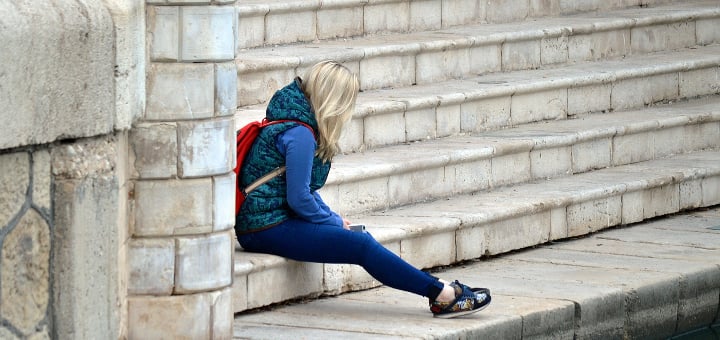
 Image credit: Pixabay.com (2016), CC0/PD[/caption]
It is a distressing time to be a Catholic.
Revelations surfaced last July of the “open secret” that ex-Cardinal Theodore McCarrick (now laicized) had sexually abused both minors and seminarians for most of his career. These were followed close on the heels by the August release of a grand jury report detailing truly diabolical levels of sexual abuse by clergy throughout Pennsylvania, for decades. As if the perpetration of these horrors were not bad enough, it is now clear that many bishops were utterly negligent and even criminally complicit, failing in their duty to protect the faithful, opting instead to protect monstrous priests and their own reputations.
At Mass on the 2018 Feast of the Assumption, the day after the Pennsylvania report was released, I wept openly during the Confiteor.
Image credit: Pixabay.com (2016), CC0/PD[/caption]
It is a distressing time to be a Catholic.
Revelations surfaced last July of the “open secret” that ex-Cardinal Theodore McCarrick (now laicized) had sexually abused both minors and seminarians for most of his career. These were followed close on the heels by the August release of a grand jury report detailing truly diabolical levels of sexual abuse by clergy throughout Pennsylvania, for decades. As if the perpetration of these horrors were not bad enough, it is now clear that many bishops were utterly negligent and even criminally complicit, failing in their duty to protect the faithful, opting instead to protect monstrous priests and their own reputations.
At Mass on the 2018 Feast of the Assumption, the day after the Pennsylvania report was released, I wept openly during the Confiteor.
I confess to Almighty God and to you, my brothers and sisters, that I have greatly sinned, in my thoughts and in my words, in what I have done, and in what I have failed to do.How, I wondered, could any priest or bishop celebrate Mass and utter those words, day after day, year upon year, if he was doing (or hiding) any of these unspeakable, awful things at the same time? How could it be possible to live a life of such duplicity? Immediately after the Lord’s Prayer, though, another phrase caught my attention.
Deliver us, Lord, we pray, from every evil, graciously grant peace in our days, that, by the help of your mercy, we may be always free from sin and safe from all distress, as we await the blessed hope and the coming of our Savior, Jesus Christ.Safe from all distress. Is God really promising to keep any and all distress out of our lives? A quick look around any home, church, or nation should be enough to answer that firmly in the negative. And that’s not actually what the prayer asks. It asks that we be safe from all distress. There is exactly one way to be safe from distress, and what happens before and after that prayer (called the Embolism) should give us a clue as to how to do it. We will only be safe from distress if we abandon ourselves completely to Christ, like a little child wanting to be picked up and carried through a storm in the strong arms of his father. Abba, Father. It is no accident that this prayer falls where it does in the Mass, right after we have begged God to deliver us from evil and forgive us as we forgive, right before we promise him all glory and honor.
Providentially, the prayer after the Lord’s Prayer commanding us to "keep safe from all distress" is just prior to the Communion Rite where people can process up the aisle and place their stress on the altar for God to redeem. (Fr. Patrick Carrion in The Priest magazine)Distress is coming. Distress is here. Distress, to one degree or another, is part of the human condition. Lately, it’s a pretty high degree, if you’re a faithful Catholic who intends to stay that way. Being safe from distress does not mean the lack of distress. It means the ability to withstand it, to endure it. We endure it by staying close to the source and summit of our faith in the Eucharist. We endure it by claiming Christ’s endurance as our own. In Him, with Him in us, we are safe. Much as we want to love our Church, it can sometimes be a hard entity to love, because it is composed of people who can be all too fallible, even after they have made public vows of poverty, chastity, and obedience. The Church may indeed be the very cause of our distress, in this case, but the human institution of the Church is not what we worship. We worship God made Man. He will never be overcome by any distress of any size or any human making.
How can you show trust in the Lord during times of distress?
Copyright 2019 Christy Wilkens
About the Author

Christy Wilkens
Christy Wilkens, wife and mother of six, is an armchair philosopher who lives in Austin, TX. She writes at FaithfulNotSuccessful.com about disability, faith, doubt, suffering, community, and good reads. Her first book, Awakening at Lourdes: How an Unanswered Prayer Healed Our Family and Restored Our Faith, a memoir about a pilgrimage with her husband and son, will be released by Ave Maria Press in 2021.


.png?width=1806&height=731&name=CatholicMom_hcfm_logo1_pos_871c_2728c%20(002).png)
Comments